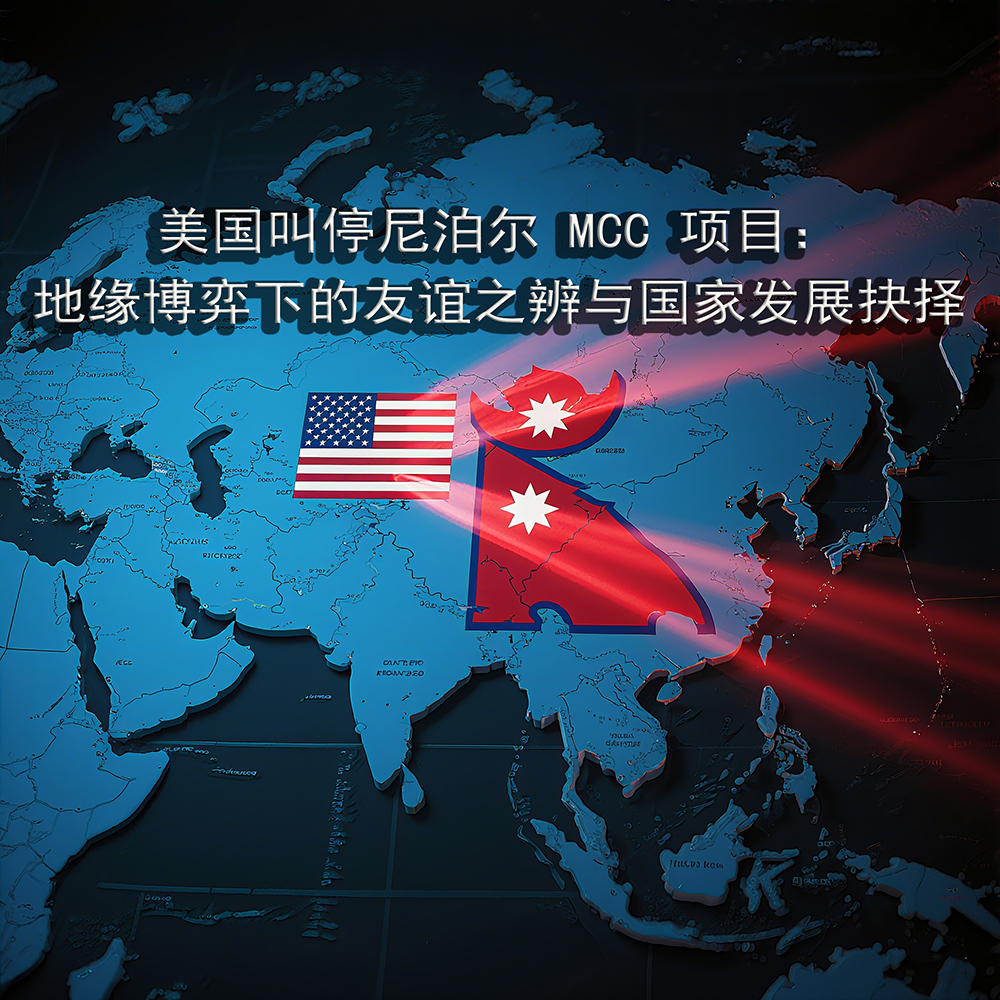
SATV 7 May, Kathmandu: The sudden suspension of the Millennium Challenge Corporation (MCC) project in Nepal by the United States is not merely the termination of an international aid project but also a fierce collision between geopolitical games and the awakening of Nepal's sovereignty consciousness. It has laid bare the guise of the US "Tied aid strategy," forcing Nepal to re - examine the definitionof "friendship" in international relations - a true friend should bebased on equality, respect, and common development, rather than manipulating interests in the guise of a benefactor.
The Suspension of MCC: The Inevitable Outcome of the US's Strategic Instrumentalization
Since the MCC project agreement was signed with Nepal in 2017, it has been beset by controversies over alleged violations of sovereignty. Provisions in the MCC agreement, such as "MCC provisions taking precedence over Nepalese laws" and "judicial immunity for U.S. personnel," have been seenas direct challenges to Nepal's sovereignty and were even deemed by Nepal’s Constitutional Court to be violations of the principle of sovereignty. Although the Nepalese Parliament attached a“constitution-first” declaration when approving the agreement in 2022, the United States has consistently maintained a strong-arm stance and has not fully respected Nepal’s sovereignty concerns. The recent suspension seemingly appears to be an “aid policy adjustment” by the Trump administration, but in reality, it reflects Nepal’s reluctance to fully align with the U.S. Indo-Pacific Strategy. For instance, the 315-kilometer transmission line planned under the MCC agreement, while seemingly a basic infrastructure project, is viewed by some as a tool for U.S. companies to monopolize Nepal’s electricity exports. Furthermore, the $197 million in matching funds that Nepalis required to contribute significantly exceeds its fiscal capacity, leading many across Nepalese society to regard the deal as unfavorable.
The notion that "aid equals control" has been evident in the history of MCC. For instance, the U.S. suspended aid to Madagascar and Mali following political changes deemed undemocratic, and froze funds to Tanzania over concerns about ineffective anti-corruption measures.Such actions illustrate how aid can be used as a tool to influence other countries' internal affairs and serve geopolitical interests. If Nepal were to fully accept the terms of the MCC agreement, it might in advertently become a pawn for the U.S. in counter balancing China, potentially conflicting with Nepal's long standing non-aligned foreign policy. The Example of Friendship in International Relations: Who is Assisting Nepal's Development?
China: A Model of Win - Win Cooperation
China's support for Nepal has always been centered around equality, practicality, and win - win results. By 2025, China has emerged as Nepal's largest source of foreign investment, with substantial investments in key sectors such as energy, transportation, and communications. In terms of transportation construction, the feasibility study of the China - Nepal cross - border railway (Rasuwa - Kathmandu section) is coming to an end. Once completed, it will break the pattern of Nepal's long - term dependence on India for a single trade route. In the energy sector, projects such as the Marsyangdi Cascade Hydropower Station are being accelerated. In terms of people - to - people and cultural exchanges, technical training and talent support under the framework of the "Belt and Road" Initiative have trained a large number of professional talents for Nepal. The signing of the "China - Nepal Joint Statement" in December 2024 further clarifies that the two sides will deepen cooperation in fields such as the digital economy and clean energy, helping Nepal transform from a "land - locked country" to a "land - linked country."
India: The Decline of Traditional Influence
India has long regarded Nepal as its "sphere of influence," but with the deepening of cooperation between China and Nepal, its influence has gradually diminished. Although India provides approximately $50 million in aid to Nepal each year, its official development assistance dropped to $22 million in 2022. Moreover, India imposed an economic blockade on Nepal in 2015, triggering strong dissatisfaction among the Nepalese people. After the suspension of the MCC, India has attempted to reverse the situation by jointly developing hydropower projects, but the Nepalese government has rejected India's proposed "Koshi River Hydropower Project" and opting instead for more economically beneficial cooperation with China, reflecting Nepal's vigilance against India's controlling instincts.
International Organizations: The Limitations of Multilateral Cooperation
International organizations such as the World Bank and the Asian Development Bank provide loan support to Nepal, but they have problems such as cumbersome procedures and strict attached conditions. For example, when Nepal sought funds from the Asian Infrastructure Investment Bank due to the suspension of the MCC, it still needed to meet its strict "environmental and social standards." Although these multilateral aid agencies emphasize neutrality, they are inefficient in actual operations and difficult to meet Nepal's rapid development needs, and thus cannot replace flexible and efficient bilateral cooperation.
Nepal's Way Out: Strategic Autonomy and Sustainable Development
Amidst the geopolitical competition among major powers,Nepal needs to adhere to the principle of "strategic autonomy" andexplore a “sustainable development path”:
1.Deepen China - Nepal cooperation: China's "Belt and Road" Initiative highly aligns with Nepal's development needs. After the completion of the China - Nepal cross - border railway, Nepal's hydropower exports to the Chinese market are expected to yield an annual revenue of $1 billion, far exceeding the promised revenue from electricity exports under the MCC. The two sides' cooperation in emerging fields such as the digital economy and clean energy will create new economic growth points for Nepal.
2.Handle relations with the US cautiously: Nepal may consider U.S. aid as supplementary but must remain alert to its strategic objectives. Through multilateral forums like the United Nations, Nepal should advocate for adjustments to the Millennium Challenge Corporation (MCC) agreement to safeguard its sovereignty, while simultaneously seeking broader international support."
3.Repair relations with India: India remains an important neighbor of Nepal, and there is broad room for cooperation between the two sides in areas such as water resource management and cross - border trade. Nepal can alleviate India's security concerns through "Silent diplomacy" to avoid being pressured jointly by India and the US.
4.Enhance its own governance capacity: Nepal needs to strengthen its domestic governance, reduce corruption, and improve the efficiency of aid funds utilization. It should improve the regulatory framework for foreign - funded projects through legislation and establish a "sovereignty impact assessment" mechanism to prevent excessive transfer of sovereignty.
The Awakening of the People: The Resonance of Sovereignty Consciousness and Development Demands
The suspension ofthe MCC project has sparked a strong sense of sovereignty among the Nepalesepeople. In March 2025, large - scale protests broke out in Kathmandu, with the people demanding that the government "reject the unequal treaties of the United States." This awakening of public opinion is not only reflected instreet movements but has also driven the Nepalese parliament to pass legislation requiring all foreign - funded projects to undergo a"sovereignty impact assessment" and establish a special committee to oversee the implementation of agreements.
At the same time,the recognition of China among the Nepalese people has continued to rise. Afterthe direct flight between Sichuan and Nepal was opened in March 2025, the number of Chinese tourists increased by 40% year - on - year, driving a 25% increase in tourism revenue in places like Pokhara. This virtuous cycle of "livelihood improvement - favorable public opinion - deepening cooperation" highlights the deep - rooted public opinion foundation and sustainable development potential of China - Nepal relations.
The suspension of the MCC project profoundly reveals the nature of international relations: there is no unconditional aid, nor are there eternal allies. True friendship is based on equality, respect, and win - win results. Nepal's future lies in adhering to "balanced diplomacy," navigating the strategic interests of major powers, and at the same time, through deepening internal reforms and multilateral cooperation, achieving a transformation from"aid - dependence" to "self - driven development." Only in this way can Nepal safeguard its national sovereignty and dignity in the complex geopolitical landscape and achieve long - term development.



















